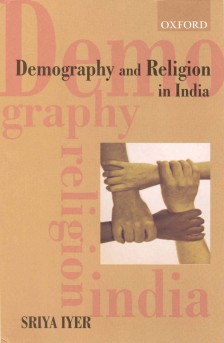Books
- Demography and Religion in India Oxford University Press, 2002.

Abstract
This book examines the interactions between religion, economics and demography. The book asks: Do religious beliefs significantly affect demographic behaviour, even after controlling for the socio-economic characteristics of populations? It examines the theological content of Islam and Hinduism in the context of population growth. It also offers quantitative evidence that religious differences in fertility and two of its proximate determinants, contraceptive choice and the age at marriage, are in fact, due to differences in socio-economic characteristics, such as access to education. The econometric analysis is based on primary fieldwork and survey data collected on Hindu, Muslim, and Christian women in India. The determinants of women's age at marriage, their contraceptive choices and their fertility are modelled and then analysed, drawing inferences for population policy, religion, social conflict, and economic development. This book would be of interest to economists, demographers, development researchers, gender specialists and anthropologists. Further information.
Papers
2016. 'The New Economics of Religion' Journal of Economic Literature, 54: 2, June, pp. 395-441.
2014. ‘Communication and Marketing of Services by Religious Organizations in India’ (with C. Velu and A. Mumit) Journal of Business Research, 67, pp. 59-67.
2013. ‘Missing Women and India’s Religious Demography’ (with S. Joshi) Journal of South Asian Development 8(3): 301-331.
2013. ‘Why Marry a Cousin? Insights from Bangladesh’ (with S. Joshi and Q. Do). In Marrying in South Asia, edited by Ravinder Kaur and Rajni Parliwala, Orient Black Swan, pp. 208-233.
2013. ‘Missing Women in the United Kingdom’ (with A. Adamou and C. Drakos) IZA Journal of Migration Volume 10, Issue 2.
2013. ‘The Economics of Consanguineous Marriages’ (with S. Joshi and Q. Do) Review of Economics and Statistics, July.
2012. ‘Dominance and Innovation: A Returns-Based Beliefs Approach’ (with C. Velu and J. Gair), Applied Stochastic Models in Business and Industry, Volume 28, Issue 3, 264–281, May/June.
2009. ‘Gender, Religion and the Age at Marriage in India'. In M. Pal, P. Bharati, B. Ghosh and T. S. Vasulu eds. Gender and Discrimination: Health, Nutritional Status and Role of Women in India, Oxford University Press.
2008. ‘Religion and Economic Development’ In Steven N. Durlauf and Lawrence E. Blume eds., The New Palgrave Dictionary of Economics Second Edition, Basingstoke and New York: Palgrave Macmillan.
2007. ‘The Effectiveness of Jobs Reservation: Caste, Religion and Economic Status in India’ (with V. K. Borooah and A. Dubey), Development and Change, Volume 38, Number 3, May, pp. 423-445.
2006. ‘Real Options and Demographic Decisions’ (with C. Velu), Journal of Development Economics, Volume 80, Number1, June, pp. 39-58.
2006. ‘Human Capital’. In David A. Clark ed. The Elgar Companion to Development Studies. North-Holland.
2005. ‘The Decomposition of Inter-Group Differences in a Logit Model: Extending the Oaxaca-Blinder Approach with an Application to School Enrolment in India’ (with V. Borooah), Journal of Economic and Social Measurement, Volume 30, Number 4, pp. 279-293.
2005. ‘Vidya, Veda and Varna: The Influence of Religion and Caste on Education in Rural India’ (with V. Borooah), Journal of Development Studies, Volume 81, Number 4, November, pp.1369-1404.
2005. ‘Social Capital, Economic Growth, and Regional Development’ (with M. Kitson and B. Toh), Regional Studies, Volume 39, Number 8, November, pp. 1015-1040.
2005. ‘Religion, Literacy, and the Female-to-Male Ratio in India’, Economic and Political Weekly, Volume 40, Number 5, pp. 419-427.
2004. 'The Risk of Child and Adolescent Mortality among Vulnerable Populations in Rio de Janeiro, Brazil', (with M. Monteiro), Journal of Biosocial Science, pp.1- 24.
2003. ‘Religion, Reproduction and Development in Contemporary India’, Development, Volume 46, Number 4, December.
2002. ‘Religion and the Decision to use Contraception in India’, Journal for the Scientific Study of Religion, Volume 4, Number 1, pp. 711-722.
New Papers
- Religious Riots and Electoral Politics in India (with Anand Shrivastava), August 2016. Also available as IZA Discussion Paper 9522; and Cambridge Working Papers in Economics 1536.
-
Religion and Depression in Adolescence (with Jane Cooley Fruehwirth and Anwen Zhang), February 2016. Also available as IZA Discussion Paper 9652; Cambridge Working Papers in Economics 1602; and Cambridge-INET Working Papers WP1601.
-
Divine Competition: Religious Organizations and Service Provision in India (with C. Velu and M. Weeks), 2016.
-
The Evolution of Cooperation through Communication: A Field Experiment in Cambridge (with C. Velu and A. Mumit), 2015.
-
A Reason for Unreason: Returns-Based Beliefs in Game Theory (with C. Velu and J. Gair), 2016. (An earlier version is IZA Discussion Paper No. 6711, 2014).
-
Social Interactions, Ethnicity and Fertility in Kenya (with M. Weeks), 2015.
Other Writing
-
'Temples and Economists', THE WHEEL publication, St. Catharine's College, June 2015.
-
The Marshall Lectures 2012-13: Esther Duflo - Paternalism, Freedom and Hope in the Fight Against Poverty (with Tony Cockerill), Cambridge Economics Alumni Newsletter, Volume 6, September 2013.
-
The Marshall Lectures 2010-11: James J. Heckman - The Economics and Psychology of Human Development and Inequality (with Tony Cockerill). Cambridge Economics Alumni Newsletter, Volume 4, September 2011.
-
The Marshall Lectures 2009-10: Drew Fudenberg - Learning and Equilibrium in Games (with Tony Cockerill). Cambridge Economics Alumni Newsletter, Volume 3, September 2010.
-
Faith, Fertility and the Field Economist, The British Academy Review, Number 7, pp. 33-35, 2003.
Research Grants
I. Spiritual Capital Research Program (Metanexus Institute and John F. Templeton Foundation, USA) project on 'Innovation and the Resilience of Religion' (2006-2009).
II. Isaac Newton Trust Research Grant (Isaac Newton Trust, UK) for project on 'Modernising the Madrasa in India' (2009-2012).
III. Cambridge-INET Institute Seed Fund Grant for project on 'An Evolutionary Study of Religious Fundamentalism' (2013-2014).
